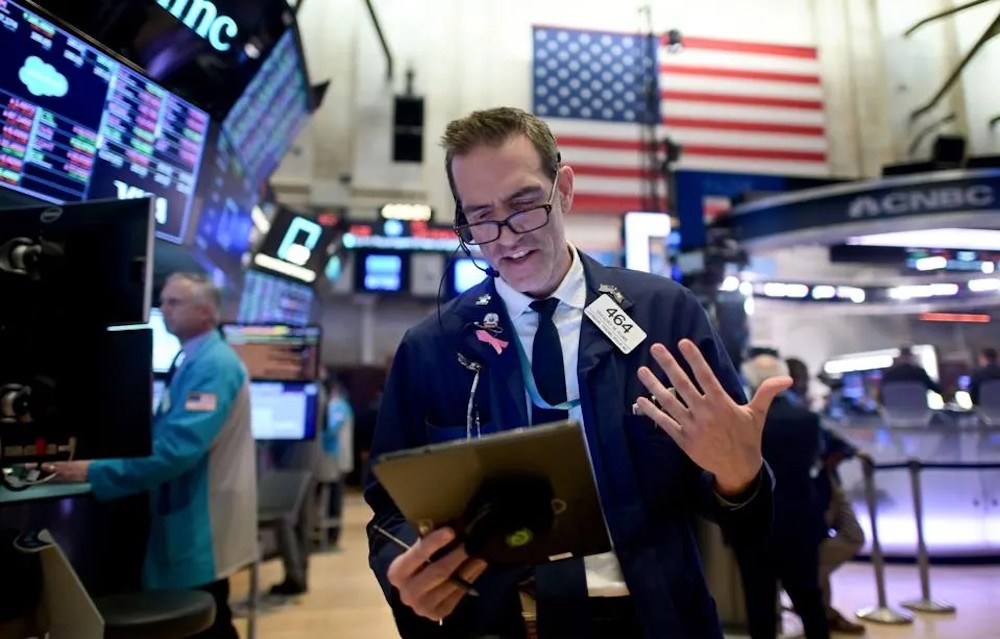
Dow futures indicated an upward trajectory on Monday, signaling a potentially favorable beginning to the week for equities following a recent period of volatility influenced by tariffs. Dow futures have risen by 245 points, translating to a 0.6% increase. Meanwhile, S&P 500 futures have climbed 62 points, or 1.2%, and Nasdaq 100 futures have seen an uptick of 296 points, representing a 1.6% gain.
U.S. stock futures are showing a slight increase as market participants evaluate the implications of certain temporary technology-related exemptions to President Donald Trump’s heightened reciprocal tariffs. Trump has indicated that these products will continue to face the smaller levies that were implemented earlier this year, and he has committed to reviewing the entire electronics supply chain. In March, China experienced a significant increase in exports, indicating that U.S. importers were hastily procuring goods ahead of the impending tariffs on Chinese products introduced by the Trump administration. Apple’s shares experienced an uptick in premarket trading in the United States.
The major indices concluded the previous trading session with gains, marking the end of a week characterized by fluctuating updates regarding Trump’s tariff strategies, which led to significant volatility in stock prices, oscillating between notable declines and substantial increases. A recent sell-off in the bond market has raised concerns regarding the traditional safe-haven status of U.S. Treasuries, leading to heightened anxiety among investors. On Friday evening, the White House revealed that smartphones, computers, and various electronics would receive a temporary exemption from the punitive tariffs imposed by Trump, a move that is expected to enhance market sentiment.
In a recent statement, Trump indicated that the current situation is temporary and hinted at the potential announcement of a tariff rate on imported semiconductors within the coming week. This news provided a measure of relief to the markets. The technology sector has faced significant challenges amid the escalating trade tensions between the United States and China in recent weeks.
This week, traders are expected to closely monitor potential tariff announcements from Washington, alongside a new wave of corporate earnings reports and significant economic data emerging from China. Chinese technology stocks, particularly those supplying components to Apple, experienced a significant increase on Monday following indications from the Trump administration that certain electronics would be excluded from reciprocal trade tariffs.
In China, shares of Apple suppliers including Luxshare Precision Industry Co Ltd and AAC Technologies experienced an uptick, alongside a rise in the stock of electronic devices powerhouse Lenovo Group. The Hang Seng index experienced a notable rally. Several Chinese technology stocks, including chipmaker Semiconductor Manufacturing International Corp and major internet players Alibaba, Baidu, and Tencent Holdings Ltd, have managed to recover some of their recent losses.
China’s electronics manufacturers face significant exposure to U.S. exports, largely due to their critical role in the supply chain of major technology companies like Apple. The ongoing trade conflict initiated by Trump poses a significant risk to the stability of this trend. “The tariff exemptions signify a measured step back in President Trump’s trade conflict with China,” stated Paul Ashworth, Chief North America Economist at Capital Economics, in a communication to clients.
In March, China’s trade balance exceeded expectations, bolstered by a significant increase in exports, which appears to be driven by proactive front-loading ahead of the anticipated U.S. trade tariffs. In a significant development, the trade balance of the world’s second-largest economy surged to a surplus of $102.64 billion in March, according to data released by the government on Monday. The reported figure exceeded expectations, coming in at $74.30 billion. Exports experienced a remarkable increase of 12.4% compared to the same period last year, significantly surpassing the anticipated growth of 4.4% projected by economists. The increase appears to be driven by U.S. importers striving to obtain substantial volumes of international shipments ahead of the impending implementation of Trump’s tariffs.
Goldman Sachs, a leading player in the banking sector, is set to take center stage in a series of corporate earnings reports on Monday. This comes in the wake of several Wall Street counterparts expressing concerns that tariffs imposed by Trump may negatively impact earnings and hinder dealmaking activities. Goldman Sachs is expected to announce first-quarter net revenue of $14.76 billion, along with adjusted earnings per share of $12.26, as per Bloomberg consensus estimates.
In a recent development, top executives at major financial institutions, including JPMorgan Chase and BlackRock, expressed concerns regarding the potential impact of levies on overall economic activity. Notably, JPMorgan CEO Jamie Dimon highlighted that he is closely monitoring reports suggesting that certain initial public offerings and deals have been canceled as a result of the tariffs. In a recent statement, Wells Fargo CFO Michael Santomassimo indicated that corporate and commercial banking clients are starting to adopt a more cautious approach, opting to pause and seek greater clarity regarding the trajectory of Trump’s trade policy. Morgan Stanley CEO Ted Pick has expressed optimism regarding the U.S. economy, forecasting that it will sidestep a recession, even as he acknowledges potential risks stemming from tariffs.
Oil prices showed signs of stabilization on Monday after experiencing recent declines. These losses were largely attributed to worries that the ongoing trade tensions between the United States and China, the world’s two largest economies, could dampen global economic growth and subsequently reduce fuel demand. Brent futures experienced a modest increase of 0.3%, reaching $64.93 per barrel. West Texas Intermediate crude futures in the U.S. experienced a rise of 0.3%, reaching $61.66 per barrel. Since the beginning of the month, both contracts have experienced a decline of approximately $10 per barrel.
In other developments, Bitcoin has gained some stability as investor risk appetite showed slight improvement following the announcement of U.S. tariff exemptions. Concurrently, an index measuring the dollar’s performance against a range of major currencies experienced a downward trend, while gold prices retreated from their recent record highs.
